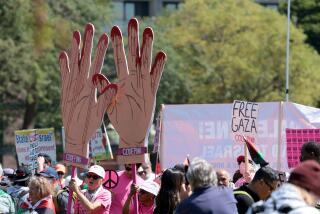Some Gays Follow March With Lobbying : Aftermath: Visits to Capitol Hill were part of a concerted move by political organizations in a bid to shed light on the issues.
- Share via
WASHINGTON — The young gay man from Florida looked across the table at the two Senate aides no older than himself. A Stanford University student infected with the AIDS virus, he wanted the staff of Sen. Bob Graham (D-Fla.) to hear his story.
“I feel I’m really representative of the resources that are being lost to this country. . . . I’m not able to give back what I receive. I think a lot of it is politics,” he concluded.
Then he was off with his boyfriend to catch a plane, having lobbied all the way to the end of a weekend that filled Washington with a collective plea for gay rights. Hundreds of thousands of gays and lesbians flooded this city for days of socializing and politicking, parading past the White House on Sunday in a march that lasted for more than six hours.
Monday, many remained in the city to sightsee, drop in on congressional offices and participate in smaller, scattered protests before heading home.
The Stanford student, who asked that his name not be used, was among about 70 gays and lesbians who have trooped into the offices of the Florida Democratic senator since last Thursday to lobby for gay rights, an end to the military ban on homosexuals and increased federal attention to the AIDS epidemic.
“If Sen. Graham has ever played on a sports team or been in the YMCA, we’ve all been in those situations and behaved appropriately,” stressed Blake Spears of Oakland, countering arguments that the intimate quarters of the military are no place for those who are openly gay. He was lobbying with his boyfriend, a Florida resident.
Graham’s aides were sympathetic but noncommittal. They explained that the senator, a member of the Senate Armed Services Committee, had not decided whether he believes the ban should be lifted.
Although Graham has not met with any of his visitors, staff members seemed touched by the sessions. “It was truly amazing, these stories,” said Shannon Edge, who works on defense matters for Graham. “They were very powerful, very moving. It was meeting them in person, seeing their faces. . . . It definitely had an effect.”
Gay political organizations and march organizers made a concerted effort to encourage lobbying, even setting up training sessions at a local hotel to educate their members on the issues. More than 5,000 took the classes, said Marla Randolph Stevens of the march executive committee. On Capitol Hill, some gays were assigned to hall meetings with aides, some met with higher level staff members and a few managed to get sessions with members of Congress.
But lawmakers representing districts without significant gay populations got little attention. And a spot check of congressional offices representing moderate-to-conservative districts found that Sunday’s march seemed to have little impact on constituents or lawmakers.
Rep. Charles Stenholm (D-Tex.), an influential leader of conservative House Democrats who opposes lifting the military ban against homosexuals, had only four gay visitors--none from his rural Texas district. The office has received a few calls from constituents “expressing disgust at the (gay march) activities,” said Stenholm spokesman John Haugen.
Rep. Tom Bevill (D-Ala.), a powerful member of the House Appropriations Committee from a rural district in the Bible Belt, has had no visitors from the gay community and no phone calls from his constituents.
“He will not be influenced by the march. He is going to listen to the majority of the people in his district, who are pretty conservative,” said a spokeswoman, Olivia Barton. “The perception in our district is that this is more of a California thing. I think Mr. Bevill will take a pretty realistic view of how his constituents feel.”
A small group visited the office of Rep. Thomas Petri (R-Wis.) Friday but an aide said that he has received no calls from constituents.
Would Petri be impressed by the gays’ demonstration Sunday? “He takes the position that they have every right to petition the government. It is impressive whenever any group mounts a big demonstration,” Wright said.
Just how big the march was continued to be a point of contention Monday. Park Police stood by their estimate of 300,000 marchers--a figure roundly criticized by participants as too low. March organizers, meanwhile, continued to claim attendance of 1.1 million and urged marchers to call the White House and complain about the Park Service estimate.
Pat Lambe, a spokeswoman for the city’s Metro rail system, said ridership reached 413,000 Sunday--about 287,000 more than normal. By comparison, during the abortion-rights protest last April, Park Police estimated a crowd of 500,000 and Metro registered 417,000 riders.
In one protest on Capitol Hill, a few dozen protesters carrying mock coffins blocked the intersection of Delaware and Constitution avenues for about 30 minutes until they were hauled away in buses by Capitol Police.
Times staff writers Paul Houston and Robert L. Jackson contributed to this story.
More to Read
Get the L.A. Times Politics newsletter
Deeply reported insights into legislation, politics and policy from Sacramento, Washington and beyond. In your inbox three times per week.
You may occasionally receive promotional content from the Los Angeles Times.











